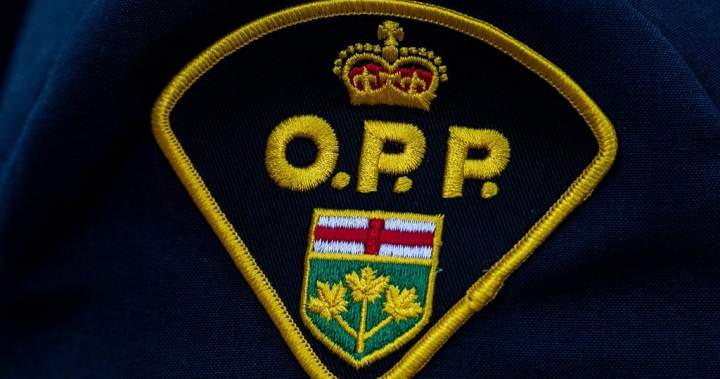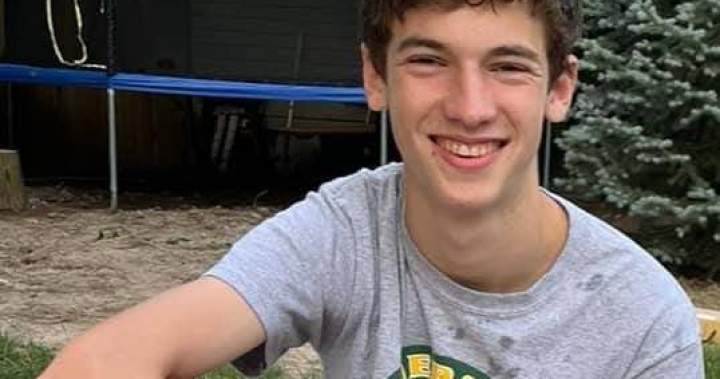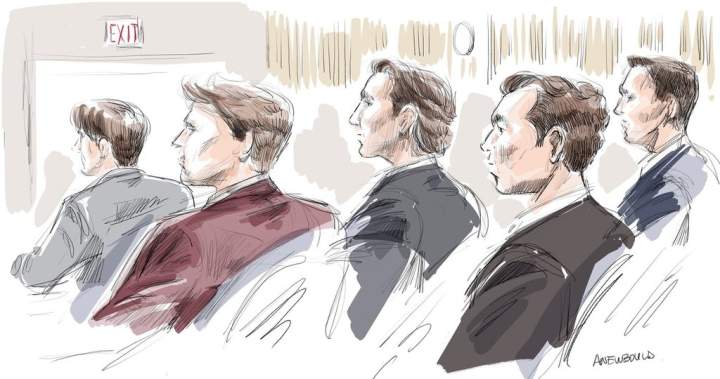Uncategorized
Ford acknowledges water bomber pilot shortage, launches request for national fire plan

Premier Doug Ford has acknowledged that his province has a shortage of pilots trained in the difficult task of flying water bombers over forest fires, as blazes continue to rage across northern Ontario.
Earlier in the season, the union representing front-line firefighters said planes in the province were grounded because Ontario didn’t have enough pilots to fly the water bombers it currently owns.
It’s a claim the Ministry of Natural Resources confirmed to Global News, although it did not say exactly how many planes are grounded or how often.
On Tuesday, at a meeting of the nation’s leaders in Muskoka, Ont., Ford said there were pilots in the province, but suggested they don’t have the training to fight fires.
“We have lots of pilots, but you have to also understand you can’t just have any pilot with these water bombers,” he said.
“And then we have the helicopters, too, that carry an enormous amount of water as well. So I think it’s all hands on deck as well.”
The Ford government has said it is ordering new water bombers, but the premier complained they take up to four years to build.
Ford, as the chair of the Council of the Federation, is leading a push from the country’s premiers to have the federal government take on a bigger role in fighting fires.
“What happens every single year, and we know what’s going to happen, there’s wildfires right across the country,” Ford added on Tuesday.
“We need a national program that we can call on for resources.”

Get daily National news
Get the day’s top news, political, economic, and current affairs headlines, delivered to your inbox once a day.
That request is being floated for the first time this year during a potentially record-breaking summer for the country, where more than five million hectares of land have already burned.
At the close of the second day of a leaders’ summit in Huntsville, Ont., this week, Canada’s premiers agreed to a joint statement requesting that the federal government provide “adequate and flexible federal funding” for emergencies.
The request was also made for help in creating national standards and co-ordinating during emergencies.
The plan is one that New Brunswick Premier Susan Holt said was talked about for the first time this week.
“That’s a new one that we started discussing in light of the fires that are being experienced across a lot of provinces,” she said on Tuesday.
“So we started the conversation on what provinces need to be able to respond as quickly as possible and what level of communication is helpful, and what level isn’t.”
Wildfires have devastated the northern reaches of provinces across Canada this year. Figures last week showed more than 5.5 million hectares had burned since January, more than double the 10-year average of 2.12 million.
In Manitoba, roughly 5,000 residents were evacuated from Flin Flon because of wildfires earlier this year. Twelve months ago, in Alberta’s Jasper, 25,000 people were forced to flee two massive fires that ripped through the heart of the mountain community.
Ontario has evacuated at least 650 people from its northern communities in July alone.
Exactly what federal support would look like remains to be seen.
British Columbia Premier David Eby said he was a “cautious supporter” of the idea and would be supportive if the federal government could help to standardize systems to make it easier for different fire services to come together.
“The caution that we have is the closer you get to the ground, the more effective the fire service is, in my experience,” he said. “There is a potential role for the federal government, but I want to make sure it adds and doesn’t create bureaucracy or delay.”
Ontario Premier Doug Ford, left, and Quebec Premier Francois Legault listen to questions from the media during the 2025 summer meetings of Canada’s Premiers at Deerhurst Resort in Huntsville, Ont., on Wednesday, July 23, 2025.
THE CANADIAN PRESS/Nathan Denette
Back in Ontario, however, opponents of the Ford government say it has failed to invest in the program and stress federal support is no substitute for a well-run local program.
“Every part of the country, every part of the world has different kinds of fires, depending on what kind of wood is there,” NDP MPP Lise Vaugeois said.
“Whether we’re talking about bogs or peatlands or boreal forests or old-growth forests in British Columbia, they all burn differently.”
— with files from Global News’ Ari Rabinovitch
© 2025 Global News, a division of Corus Entertainment Inc.
Uncategorized
5 commercial tractor trucks stolen in early morning theft: Ontario police


Five transport trucks were stolen early Thursday morning in Midhurst, Ont., with police searching for suspects and a grey car seen fleeing the scene.
Source link
Uncategorized
Ontario family sues hospital and staff over son’s death

Finlay van der Werken’s life is now a collection of memories closely guarded by his parents. The 16-year-old is remembered as a loving son, a devoted older brother and a loyal friend.
“I still hear his laughter,” his father, GJ van der Werken, said. “Finlay was a typical oldest son. (He was) very responsible, looking after his twin brothers, making friends wherever he went.
“He had the tendency to gravitate towards kids that didn’t seem to have any other friends or that seemed to be struggling with school or contact, so he would just embrace them and make them feel welcome.“
In early February of 2024, a migraine kept Finlay home from school. His mother, Hazel, said this would sometimes happen if Finlay was getting sick. But his condition got worse, and Hazel decided to take him to Oakville Trafalgar Memorial Hospital.
“He was crying out in pain a lot, and just kind of looking at me, like get me there somewhere,” Hazel said. “You could tell he didn’t know what was going on, but he knew it was not normal, so I drove as fast as I could.
“When I got to the hospital. I just abandoned the car at the doors of ER and we ran in. There was just so many people. The corridors were lined with people. We sat down and Finlay just kept crying out. He never cries out in pain. He would never do that if it wasn’t really an emergency.“
Photos provided by Hazel van der Werken.
Hazel says he would not see a doctor for hours, despite telling the nurses Finlay was not doing well.
“When I went up at three in the morning, they said, well, we only have one doctor, but there’s another one coming in at four. I don’t know where that one doctor was,” Hazel recalled.
In reviewing the hospital records, Martin and Hillier lawyer, Meghan Walker, said, “Finlay was triaged at almost exactly 10:00. He wasn’t actually seen by a physician until 6:22 in the morning.”
According to the statement of claim about what happened, when he was seen the following morning, the doctor said Finlay “was experiencing sepsis/pneumonia with hypoxia and he was at high risk for acute deterioration.”

Get weekly health news
Receive the latest medical news and health information delivered to you every Sunday.
His oxygens levels, which the lawyer said hospital records show had been dropping throughout the night, were also a concern.
“I remember just saying to Finlay, like Finlay we’ve got to get, you know, we’re looking at this screen that’s got his oxygen saturation and I’m like, we have to get it up,” Hazel said.
“His breathing was so shallow by this point, and he said, ‘I can’t do deep. It hurts too much,’ and I said, you’ve got to try, you got to try.”
Finlay eventually needed to be intubated. The decision was made to transfer him to SickKids hospital in Toronto. But before that could happen, he went into cardiac arrest. The statement of claim said “the contributing cause of arrest was listed as septic shock, pneumonia.”
Photos provided by Hazel van der Werken.
Finlay arrived at SickKids and was taken to the ICU. He was in hypotensive shock and placed on ECMO, a life-support system that helps take over a patient’s heart and lung function.
But staff told Hazel and GJ that Finlay’s organ function was getting worse, and to continue on ECMO was considered “futile.”
“We had to make the decision… take Findlay off life support,” Hazel said through tears. GJ added, “Or risk that the situation would escalate even more and he would wake up and die in a lot of pain.”
After Finlay died, Hazel and GJ say they met with hospital staff to review what happened. “They didn’t say they were wrong,” Hazel said. “But they acknowledged that if Finlay had been seen earlier, it could have been a different outcome.“
Global News reached out for comment on this story.
In a written statement, Halton Healthcare officials said, “We are deeply committed to delivering high-quality, compassionate care to the communities we serve across all three of our hospitals: Milton District Hospital, Oakville Trafalgar Memorial Hospital, and Georgetown Hospital, as well as our community sites.
“Like many hospitals, we are seeing more patients presenting with increasingly complex health conditions and co-morbidities, often requiring longer stays and more intensive care. This places significant demand on our emergency departments, patient flow, bed availability and the patient experience.”
Photos provided by Hazel van der Werken.
The family has since launched a lawsuit alleging, in part, that the health care team failed to monitor Finlay, have appropriate protocols in place for his treatment, or inform the family of the true nature of his condition.
Meghan Walker is the lead counsel on the matter.
“The experts are quite clear and unequivocal that this was a treatable condition and had he been treated promptly, there is no doubt in my mind that he would still be here today, which I think is the hardest thing for my clients to deal with,” Walker said.
“He was triaged as the second-highest level in triage. The guidelines say that 95 per cent of the time, they should be seen within 15 minutes.”
The hospital says they are making changes to track data more closely, refining their on-call coverage criteria protocols and other tools and working groups to improve patient flow and communication.
In an update provided July 18, they noted that a “Length of Stay Committee” was launched in fall of 2024 and a “Command Centre” was opened on July 1, 2025, with the goal of helping improve flow in their emergency departments. Furthermore, Dr. Ian Preyra has been onboarded as the new Vice President of Medical Affairs and Academics, and Dr. Prashant Phalpher is the new Chief of Emergency and Program Medical Director.
But the family wants more awareness so something like this never happens again.
“We feel that we have been let down and we cannot trust the medical system as it is right now,” GJ said. As a result, the van der Werken family is launching an awareness campaign called “Finlay’s Voice.”
“We felt we needed to stand up in place of Finlay and be his voice in the sense of what is it we can do,” Hazel said. “We’ve been through this tragedy and we’re still living that every day. We can choose to say nothing, we can choose to be silent… but if you don’t tell these stories, nobody knows.
“If you don’t tell the stories, then how is change brought about?”
The family hopes their tragedy can spark renewed efforts to improve deficiencies in the health care system, and is calling on MPPs, the Ministry of Health and local stakeholders to get involved.
Halton Healthcare declined an on-camera interview and by email told Global News they do not comment on individual patient cases or litigation matters.
As of Friday, July 25, Walker said a statement of defence had not been filed.
Uncategorized
World juniors case raises consent questions, but appeal unlikely: experts

An appeal by Crown prosecutors of Thursday’s acquittal of five hockey players in the high-profile world juniors sexual assault case is unlikely, legal experts say, despite questions about whether consent was properly considered.
Michael McLeod, Carter Hart, Alex Formenton, Dillon Dubé and Cal Foote were found not guilty of all charges after a weeks-long court case that centred on an alleged group sexual encounter in London, Ont., in 2018, in which the players had been accused of non-consensual sex.
The Crown has 30 days to decide whether to appeal the decision to a higher court.
In her ruling, Ontario Superior Court Justice Maria Carroccia said she did not find the female complainant, known as E.M. in court documents due to standard a publication ban, “credible or reliable.” She also dismissed the Crown’s argument that E.M. had only consented out of fear.
“This case, on its facts, does not raise issues of the reformulation of the legal concept of consent,” she said in her decision.
While those statements and others made by Carroccia have been criticized, even legal experts who take issue with them say they may not be sufficient grounds for an appeal.
“I don’t agree with the way that the judge came to her decision, but the decision is really well-reasoned,” said Daphne Gilbert, a legal professor who teaches courses on sexual assault law at the University of Ottawa.
“Appeal standards aren’t just that you disagree with the result. You have to to show an error in law. And I don’t see an error in law in the decision itself.”

How the legal definition of consent factors in
Melanie Randall, a Western University law professor whose research includes women’s autonomy rights, said Canada’s “extremely progressive statutory definition of consent” in criminal law means “we’re not looking for the ‘no,’ we’re looking for the ‘yes.’”
In other words, she said, a judge or jury must take into account the female complainant’s own mindset behind her decision to consent to a sexual act, and determine if that consent is truly voluntary, which can be a subjective assessment.
The court heard during the trial that E.M., who testified she was drunk and not of clear mind, was in the washroom after she had consensual sex with McLeod on the night in question and came out to a group of men in the room allegedly invited by McLeod in a group chat.
It was then that the Crown alleged several sexual acts took place without E.M.’s consent.

Get breaking National news
For news impacting Canada and around the world, sign up for breaking news alerts delivered directly to you when they happen.
Defence lawyers suggested E.M. wasn’t as drunk as she said she was, wanted a “wild night” with the players, was “egging” them on to have sex with her and accused her of having a “clear agenda” during the court process, which was a judge-only trial.
E.M. pushed back against those claims and at points outright rejected them, saying she was coaxed into staying in the room and was disrespected and taken advantage of by the group, who she said “could see I was out of my mind.”
“E.M. was unwavering in telling the court that she did not consent, she did not want this, she did not provide her voluntary agreement,” Randall said.
“She explained in excruciating detail why it was complex for her to cope in that situation where she felt threatened and unsure of how to respond, and I think used a lot of strategies of appeasement and acquiescence.”

Although Randall agreed that the decision itself was legally sound, she believes Carroccia “went much further than she needed to” in the analysis of consent by ruling E.M.’s consent was voluntary.
“The judge basically said one of two things: either she knows better than E.M. does what her own subjective state was, or E.M. is a liar,” Randall said. “I think those are two very unfortunate and damaging consequences of this decision.”
Gilbert said a possible appeal could be launched on the allegation the judge was biased against E.M., but called that “kind of a nuclear option.”
“Usually you wouldn’t accuse a judge of bias from what they write in a judgment, because they’re actually making explicit the reasons upon which they made their decision,” she added.
“Bias arguments are more likely to come from attitudes in the courtroom or things that were said in the courtroom that then you felt contributed to a wrongful verdict.”
She suggested the judge could have done more to rein in the defence lawyers in their cross-examination of E.M., which the complainant’s lawyer Karen Bellehumeur said after the verdict Thursday was at times “insulting, unfair, mocking and disrespectful.”
“A fair trial is one where decisions are made based on the evidence and the law, not on stereotypes and assumptions, and where the trial process respects the security, equality and privacy rights of the victim, as well as the accused persons,” Crown attorney Meaghan Cunningham told reporters outside court Thursday.
Toronto lawyer Lorne Honickman told Global News the Crown will likely look “very, very closely” at the issue of consent in the judge’s ruling as it determines its next steps.
“If they believe that there may have been an error there in law, they will take this 30-day appeal period or review period to determine whether or not they want to appeal,” he said.
“Perhaps — and I underline ‘perhaps’ a hundred times — a higher court will be looking at the issues here and making further determinations.”

Scientific context missing in consent argument
In her ruling, Carroccia noted the Crown did not present any scientific evidence or testimony she could consider that would support its claims that E.M.’s had only consented under fear or duress — something scientific experts were also puzzled by.
“I think the complexity of how the complainant responded isn’t well understood,” Dr. Lori Haskell, a Toronto-based clinical psychologist who specializes in trauma and abuse and has served as an expert witness in previous trials, told Global News.
Haskell cited neuroscientific research that has shown how the brain can shut down parts of the prefrontal cortex that affect decision-making, logic and reasoning in stressful or threatening scenarios.
“They’re now in survival brain,” she said of people during situations of real or perceived threats.
“It’s easy when you’re not in that situation to assume you could (fight or run away), but I think we need to look at, what are similar situations? How do people respond?”
She continued: “I mean, how do men respond to hazing on sports teams? We know young men in universities have been quite traumatized with things done to them.”
Without that further context, experts like Gilbert and Randall said the judge’s ruling appeared to accept some of the most widely-held myths regarding sexual assault, including arguments made by the defence lawyers that E.M. had “created a lie” out of regret and embarrassment.
“Although the slogan, ‘Believe the victim,’ has become popularized as of late, it has no place in a criminal trial,” Carroccia wrote at one point in her decision.
“To approach a trial with the assumption that the complainant is telling the truth is the equivalent of imposing a presumption of guilt on the person accused of sexual assault and then placing the burden on him to prove his innocence.”

London, Ont., defence lawyer Phillip Millar told Global News he felt “relief” to see that sentiment expressed in the decision.
“I was worried our judicial system has (been) going too far in terms of buying into the ‘believe all victims’ (idea) before the person has been determined to be a victim by the justice system,” he said.
“What was done is the law of consent was properly applied. You can’t redefine consent because it’s inconvenient to you, or because you want to retroactively retract it. Just because you’re not proud of what you did on a day doesn’t give you the ability to redefine what is consent.”
Randall and Gilbert noted that acquittals mean the threshold of proving something beyond a reasonable doubt was not met by the Crown, but how Canadians and those in the public realm view the details laid out during the court process may be another question.
“I don’t think an appeal is the only strategy here,” Gilbert said. “I think there’s lots of things we can respond to this judgment with that are, you know, powerful things to respond with that aren’t necessarily appealing.”
-

 Uncategorized2 months ago
Uncategorized2 months agoAccording to Dior Couture, this taboo fashion accessory is back
-

 Uncategorized2 months ago
Uncategorized2 months agoThese ’90s fashion trends are making a comeback in 2017
-

 Uncategorized2 months ago
Uncategorized2 months agoThe old and New Edition cast comes together to perform
-

 Uncategorized2 months ago
Uncategorized2 months agoUber and Lyft are finally available in all of New York State
-

 Uncategorized2 months ago
Uncategorized2 months agoNew Season 8 Walking Dead trailer flashes forward in time
-

 Uncategorized2 months ago
Uncategorized2 months agoMeet Superman’s grandfather in new trailer for Krypton
-

 Uncategorized2 months ago
Uncategorized2 months ago6 Stunning new co-working spaces around the globe
-

 Uncategorized2 months ago
Uncategorized2 months agoThe final 6 ‘Game of Thrones’ episodes might feel like a full season







